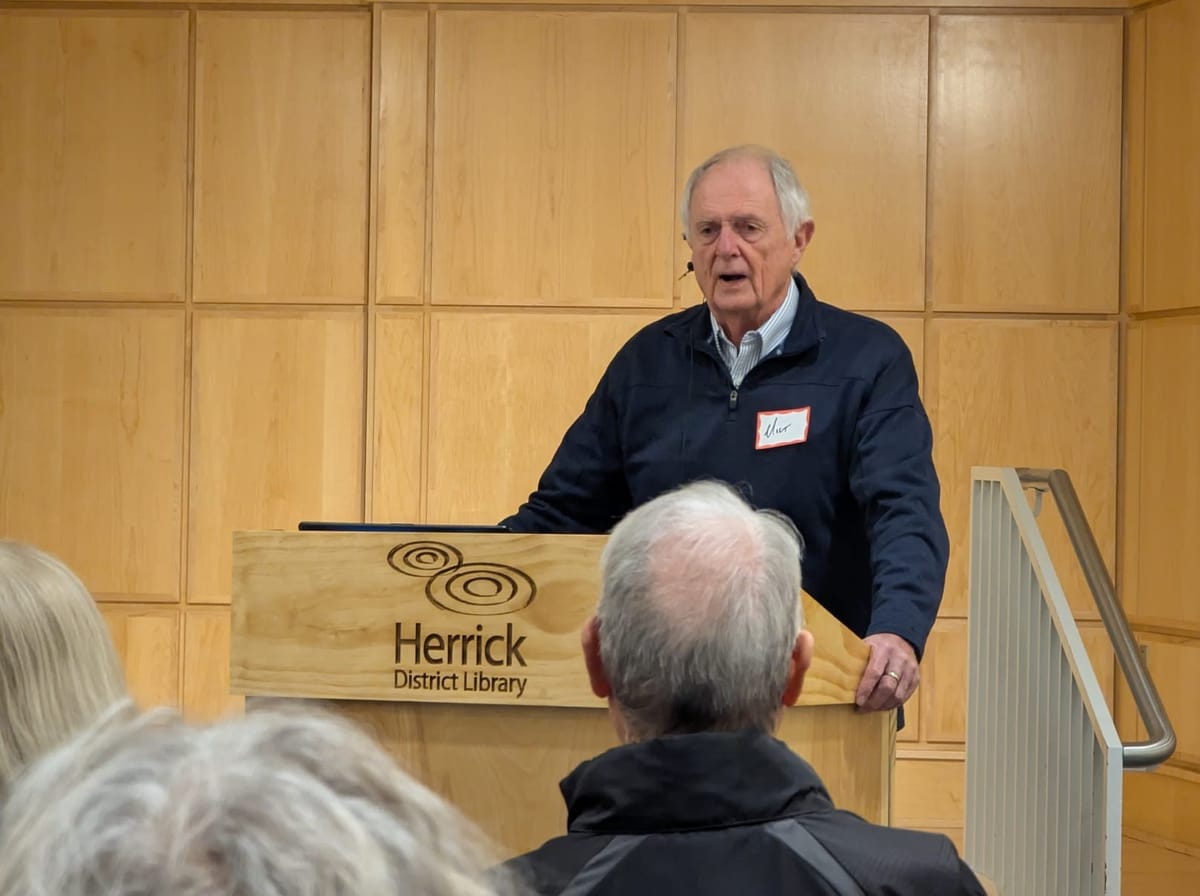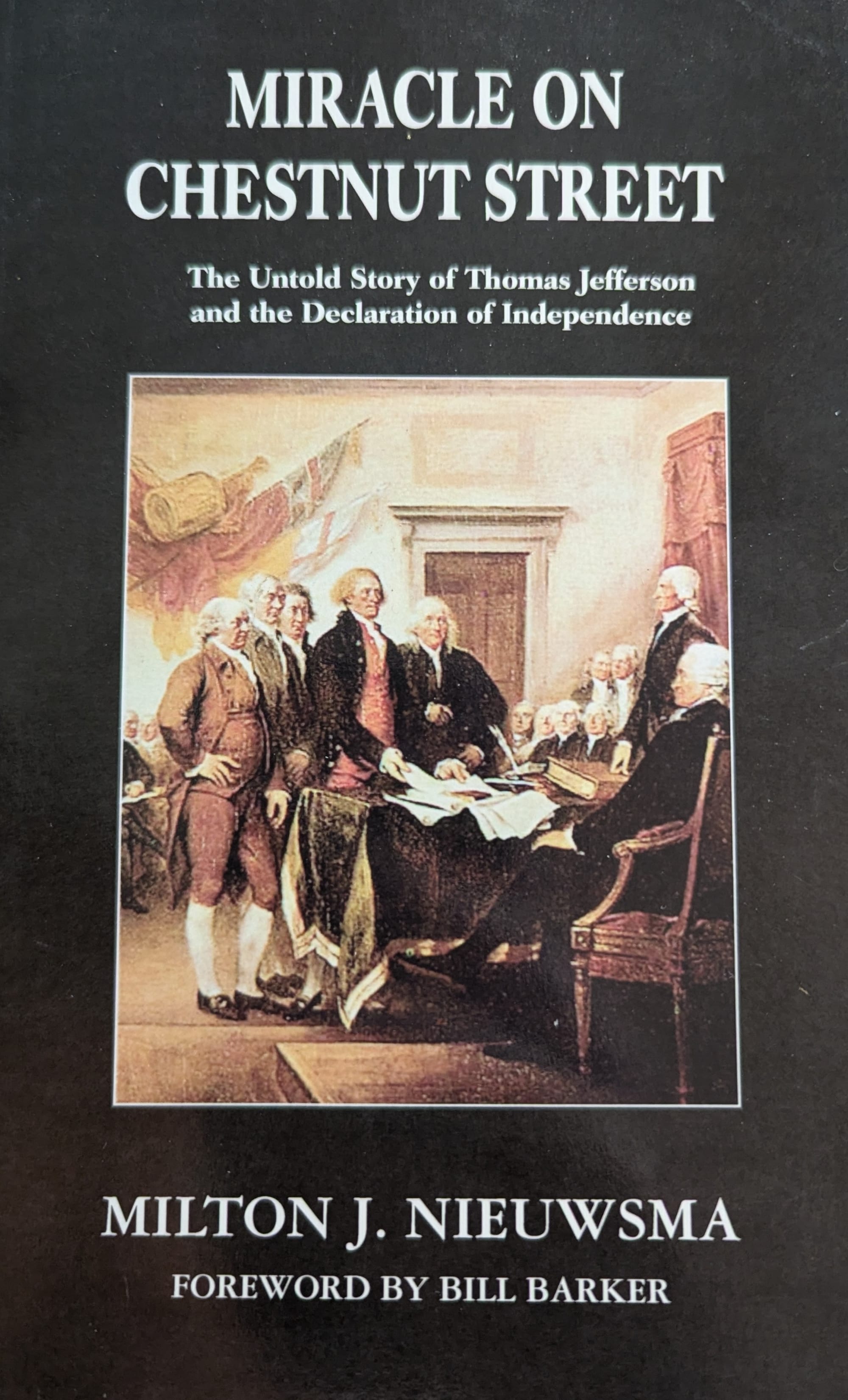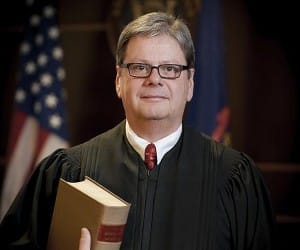Local author share's Jefferson's 'miracle' story in new book geared toward young adults
One of Holland's most prolific authors has released a new book explaining the story of the Declaration of Independence's inception from Thomas Jefferson's point of view.

HOLLAND — One of Holland's most prolific authors has released a new book explaining the story of the Declaration of Independence's inception from Thomas Jefferson's point of view.
Jefferson, one of the most well-known founding fathers of the United States, "defined the idea of America, the idea that individual freedom is basic to our way of life," said Milton J. Nieuwsma.
Nieuwsma, a journalist and author, is arguably most well-known for his PBS series "Inventing America: Conversations with the Founders," a co-production of Hope College and WGVU Public Media that tells the story of the United States’ three foundational documents: the Declaration of Independence, the U.S. Constitution and the Bill of Rights.
Nieuwsma has written extensively on Jefferson, whom the author describes as "our country's first human rights champion."
"Even with all of our problems today, our country is still a beacon of hope and freedom to people around the world. We owe that mainly to Jefferson," Nieuwsma said.
Nieuwsma, 83, recently released a new book, "Miracle on Chestnut Street: The Untold Story of Thomas Jefferson and the Declaration of Independence," which brings a fictionalized narrative to historical events to bring one of the country's greatest stories to life.
"It's about the events in Jefferson's life that led up to his writing the Declaration of Independence," Nieuwsma said during a recent presentation on the book in Holland's Herrick District Library. "This program couldn't be better timed, because it was 250 years ago this month, March of 1775, that Jefferson, who was a complete unknown like Bob Dylan, was elected to the Continental Congress. It was also 250 years ago this month, at the same convention where Jefferson was elected, that Patrick Henry gave his famous 'Liberty or Death' speech that triggered the American Revolution."
Nieuwsma describes Jefferson, a young plantation owner from Virginia, as the least likely member of the Second Continental Congress to make name for himself when he arrived in Philadelphia in 1775 — and his presence there was by default.
"He had been sent there as a substitute for a distant cousin," Nieuwsma explained. "He resented having to leave a sickly wife at home where they needed his attention. Most of all, he disdained politics, yet we associate Jefferson's name more than any other with what happened on the most important day in American history: July 4. 1776.
Jefferson, who had served a few terms in the Virginia House of Burgesses when he arrived at the Second Continental Congress, did not distinguish himself in any way, except for a paper he wrote in 1774 — two years before the first shot was fired at the Battles of Lexington and Concord in 1775 that marked the start of the Revolutionary War — called "A Summary View of the Rights of British America."
Jefferson, Nieuesma said, intended the paper to be a working document of resolutions for the Virginia delegates going to Philadelphia for the First Continental Congress.

"He wrote this paper in an attempt to justify the stand he wanted his fellow Virginians to take when they went to Philadelphia, specifically on the issue of tariffs," Nieuwsma said.
"He argued that because the colonists who had come from England had submitted voluntarily to the authority of the British Parliament; the key word here is voluntarily ... they could, if they chose to do so, release themselves from that authority. In other words, what was freely given could be freely taken away. ... This was unique in the history of the British Empire," Nieuwsma said.
Jefferson's paper made its way through the delegates of the First Continental Congress — he couldn't attend due to an unfortunate bout of dysentery — and it made it on the radar of the British crown as well.
"It was this paper that established his reputation as a writer, as someone who could articulate the colony's case against the British Parliament," Nieuwsma said.
In June 1776, when Congress took up debate on the Declaration of Independence, Jefferson attended as a delegate and was appointed to a committee charged with drafting the declaration with other historical heavy hitters like Benjamin Franklin and John Adams.
Franklin then suffered a bout with gout, which left the drafting of the declaration to Adams or Jefferson — and Adams insisted Jefferson do the deed.
Nieuwsma said the story on how the document came to be is one of the many twists of fate history can often present, such as the fact that the U.S. observes July 4 as the signing of the Declaration of Independence — when it actually was ratified on July 2, 1776.
Nieuwsma said it's important not to forget the stories history can provide, as they often hold lessons from which we can continue to learn.
"What's happening today to our democracy ... it's easy to be cynical by all the hatred, discord and incivility that surround us today, I say we step back and remind ourselves what Jefferson and his contemporaries stood for," he said.
"What brought them to Chestnut Street? What ideas and principles were they striving for? What united them? Why did they create the United States of America in the first place?"
Nieuwsma began his writing career working as a reporter at The Holland Sentinel, then known as The Holland Evening Sentinel. After graduating from Hope College with an English degree, he worked as a public information officer at Wayne State University in Detroit and hosted a weekly radio program, "The Fifth Freedom," on WQRS-FM. In the late 1970s, Nieuwsma began writing historical features and travel articles for the Chicago Tribune.
While teaching journalism at Rutgers University in the mid-1990s, he met Tova Friedman, who is believed to be the youngest Auschwitz survivor, which inspired him to write the book "Kinderlager" ("Children's Camp"). Friedman is one of three children featured in the book, which has been ranked as one of the top 10 books written on the Holocaust.
In 2005, the book was reissued under the title "Surviving Auschwitz: Children of the Shoah" as a companion to the PBS documentary, which Nieuwsma wrote and co-produced, earning him an Emmy award.
Support Our Work
Ottawa News Network is a nonprofit news service dedicated to providing the residents of Ottawa County with trustworthy, community-driven news. ONN treats journalism as a public good — something that enriches lives and empowers Ottawa County’s 300,000-plus residents to stay engaged, make informed decisions, and strengthen local democracy. Please consider giving today.
Nieuwsma won a second Emmy in 2006 for writing and co-producing "Defying Hitler," a documentary about a Jewish fighter in the Polish Resistance.
Niewsma has authored several other books, including "Dateline: World (20 Dispatches from the Earth & One from Hell)," which was released in 2023. The book chronicles stories from his long career in journalism.
He also co-wrote "Earth Angels: The Story of Peter VandenBosch and Wings of Mercy" (2012) with Peter VandenBosch, telling the story about how VandenBosch was called to found the faith-based, volunteer organization that flies low-income patients to life-saving medical centers across the country.
Nieuwsma also serves as vice chair on the board for the Ottawa News Network.
Since 1997, Nieuwsma has resided in Holland with his wife, Marilee. The couple has three children and seven grandchildren.
— Sarah Leach is the executive editor of the Ottawa News Network. Contact her at sleach@ottawanewsnetwork.org. Follow her on Twitter @ONNLeach.



